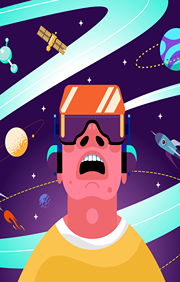The Future of Education: Adapting to an Evolving Learning Landscape
As technology and society evolve, so does education, constantly adapting to meet the needs of a diverse, tech-savvy population. The future of education reflects a shift towards dynamic, flexible models that focus on individual needs, lifelong learning, and global accessibility.
As students, educators, and institutions strive to align with these changes, an emphasis on personalized learning, online platforms, and interactive content has emerged.
In this context, the role of digital and online learning solutions has become increasingly relevant.
Integrating Digital Learning for a Global Classroom
One of the most significant shifts in the educational landscape is the integration of digital learning environments. As students increasingly rely on technology for everyday activities, educational institutions are leveraging online platforms to create interactive, accessible learning experiences.
These virtual classrooms allow learners to access high-quality education from any location, opening up opportunities previously limited by geography. For instance, education online masters programs have made it possible for working professionals to pursue advanced degrees without needing to relocate, balancing career advancement with personal responsibilities.
This development signals a trend towards inclusive, adaptable learning formats that fit various lifestyles and schedules.
Moreover, online programs cater to a range of learning preferences. Students can engage with multimedia resources, such as video lectures, simulations, and discussion boards, which create a robust learning experience beyond traditional textbooks.
This flexibility helps learners stay engaged while offering a customized educational journey tailored to personal goals and professional requirements. With more educational institutions adopting digital learning models, the global classroom continues to expand, bridging the gap between local and international learning opportunities.
Embracing Personalized Learning Approaches
Personalized learning has become a pivotal focus as educators recognize that one-size-fits-all methods often limit student growth. Technological tools, such as artificial intelligence and adaptive learning software, provide tailored content that aligns with individual skill levels, learning styles, and pace. This approach encourages students to engage deeply with their coursework, fostering greater understanding and retention of material.
Adaptive platforms, in particular, assess a student’s progress in real-time, adjusting the difficulty and focus of lessons to match their performance. For instance, if a student struggles with a specific topic, the system can offer additional resources or exercises to help them master it before moving forward.
This customization allows students to study at their own pace and achieve milestones without feeling pressured by standardized timelines. This leads to a more fulfilling educational experience.

Collaborative and Project-Based Learning Models
Collaborative and project-based learning has also gained popularity, encouraging students to work together on complex, real-world problems. By focusing on teamwork and problem-solving, these models help students develop critical thinking and interpersonal skills essential in modern workplaces.
Through projects and group tasks, students learn to approach issues from various perspectives, developing flexibility and creativity in their problem-solving methods.
Project-based learning, in particular, often involves cross-disciplinary studies, where students apply knowledge from different subjects to tackle real-world scenarios. For example, a project focused on renewable energy might require knowledge of science, economics, and social studies.
By working on tangible challenges, students gain a practical understanding of how theoretical knowledge applies in real life.
Preparing for Lifelong Learning and Career Shifts
In today’s fast-paced world, many professionals find they need to continuously update their skills to stay relevant in their fields. As a result, lifelong learning has become a critical component of education, enabling individuals to adapt to changing job markets and evolving industry standards.
Online courses, certifications, and workshops are designed to support this ongoing growth, making it convenient for professionals to learn on their own time.
The trend towards lifelong learning has led educational institutions to develop more specialized programs catering to specific career paths and industries. Short-term courses, micro-credentials, and certifications allow professionals to focus on particular skills without committing to long-term degrees.
As industries demand a broader range of expertise, these targeted programs provide valuable opportunities to stay competitive in the job market.
Additionally, self-paced courses are ideal for those looking to explore new fields or make a career change, supporting learners in gaining foundational knowledge before making a significant transition. This model fosters an adaptable workforce equipped with the tools to navigate a dynamic professional landscape and confidently pursue new career opportunities.
Addressing Accessibility and Inclusivity in Education
One of the primary goals of modern education is to create an inclusive learning environment that welcomes students from all backgrounds. With the rise of digital learning, accessibility has improved significantly, but there is still work to be done in making education truly inclusive.
To bridge this gap, institutions are focusing on designing courses and content that cater to diverse learning needs, including students with disabilities or those from underserved communities.
For example, providing captions for video content, accessible reading formats, and adaptive software ensures that students with visual or hearing impairments can fully participate in the learning experience.
Additionally, offering content in multiple languages and creating culturally relevant curricula help make education accessible to a broader audience, fostering global understanding and collaboration.
Looking Ahead: The Future of Education and Technology Integration
As technology continues to advance, the future of education will likely see even greater integration with innovative tools. Emerging technologies, such as virtual reality (VR) and augmented reality (AR), have the potential to revolutionize learning experiences by immersing students in interactive, simulated environments.
For instance, VR can enable students to explore historical landmarks, conduct complex science experiments, or even visit foreign cities, all from their classrooms.
Additionally, artificial intelligence (AI) is expected to play a prominent role in automating administrative tasks, allowing educators to focus more on teaching and supporting students. By analyzing data on student performance, AI can offer insights that help teachers adjust their methods, ensuring each student receives the support they need.
AI-driven tools could even guide students in career planning, suggesting pathways based on their strengths and interests.
While these advancements hold great promise, they also bring challenges, such as data privacy concerns and the need for digital literacy. Schools and institutions will need to address these issues, ensuring that technology enhances learning without compromising student privacy or equity.
All in all, the future of education is undoubtedly digital and adaptive, with institutions worldwide embracing flexible, inclusive models that cater to diverse student needs. By leveraging advancements in technology, personalized learning, and accessible platforms, education is becoming more dynamic, offering students the tools they need to thrive in a globalized world.
As we look to the future, education will continue to evolve, ensuring that students are well-prepared to meet the demands of an interconnected, fast-paced society.




